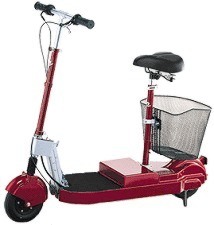It is important to read and follow the instructions and safety information
contained within this Owner's Manual prior to use.
General
Information:
Always
wear a helmet when riding.
This
product is not a toy. It is not recommended for use by persons younger than 16.
Operators
must comply with all local laws and regulations. Check with your local police or
department of motor vehicles to determine local requirements.
Your
insurance policy may not provide coverage for accidents involving this product.
Contact your insurance agent.
City Bug
requires skill to operate safely. Practice starting, stopping and turning in a
large open area, free of vehicles, obstacles and pedestrians. Only after the
operator is competent in the use of the product should it be ridden in crowded
areas.
Do not
operate the City Bug electric scooter at night. City Bug is not equipped to be
operated in the dark nor in low light conditions. It may not be visible to other
vehicles or pedestrians in these conditions.
Do not
operate the product near children. When approaching pedestrians, announce your
presence to minimize sudden, unexpected moves by pedestrians.
The
product design allows for use by only one person. Do not carry additional
people. Do not carry any items on the City Bug electric scooter, unless they are
securely placed in the basket.
Do not tow
or pull the City Bug electric scooter behind a vehicle, bicycle or pedestrian.
Do not use
the City Bug electric scooter to pull or tow anything.
Riding
Terrain:
Ride only
on smooth, hard, flat surfaces. The City Bug electric scooter is not intended
for off-road or hilly conditions.
Use
caution when approaching curbs, uneven pavement, potholes or similar conditions.
The small front wheel cannot roll over objects higher than about two inches. You
may fall when running over these items.
Do not
ride the City Bug electric scooter downhill for extended periods. This may
increase wear of the brake lining and adversely affect the ability to stop the
unit.
Mechanical
Systems:
Check all
joints, hinges and quick releases to ensure the City Bug electric scooter is
properly assembled. Stop using the product immediately if any joint, hinge, or
quick release becomes loose. Correct the looseness prior to resuming the ride.
The
electric motor, batteries, and controls can be damaged if exposed to water. Do
not allow City Bug to be used in the rain, nor to be driven through puddles of
water.
Maintain
proper air pressure in the tires. Low air pressure makes the motor work harder,
reduces ground clearance, and wears the tires.
If the
brake lever touches the handlebar grip, stop use of the product until the lever
is adjusted.
Always
deflate the tire before disassembling the wheel. Failure to deflate the tire
could cause the wheel to come apart explosively.
Battery
Information:
Completely
charge the battery for City Bug prior to the first use. Refer to the Battery
System and Charger section for more information regarding battery use.
Use
caution when recharging the batteries. Do not recharge in an area that will
allow City Bug or the charging unit to become wet. Recharge only in an area that
is well ventilated. Keep children away from the City Bug electric scooter while
it is being recharged.
Stop use
of the product or the charging unit if any wire becomes worn, broken, or damaged
in any way. Have the product inspected and serviced by an authorized dealer.
Do not
modify the electrical controls or wiring. Use only motors, batteries, and
charging units supplied or approved for the City Bug electric scooter.
Do not use
the City Bug electric scooter battery to power any other equipment.
Do not
block the air vents on the charging unit. If blocked, the charging unit may
overheat and create a fire hazard.
Replace
the fuse on the charging unit with a fuse of the same size and type.
Additional
Safety Information:
Adjust the
seat and handlebar height to provide a comfortable and secure riding position on
the City Bug electric scooter. The rider's hands must be able to easily grasp
the handlebar controls. Feet must rest comfortably on the foot rest area.
When
finished riding the City Bug electric scooter, remove the key and take it with
you. This prevents unauthorized use of the product, especially by children.
After
folding the product, be certain the steer tube is securely locked into the seat
tube latch before carrying. While carrying the product, use caution to maintain
your balance, particularly on stairs.
If service
is necessary, contact your authorized City Bug electric scooter service center.
Do not attempt to service the electric scooter yourself. Service by anyone other
than an authorized service center will void the Warranty agreement.
